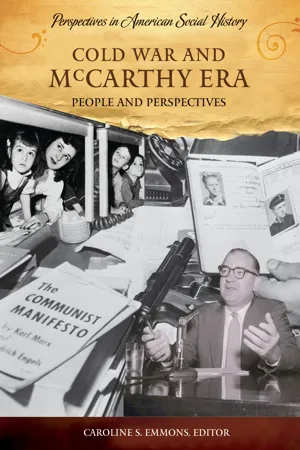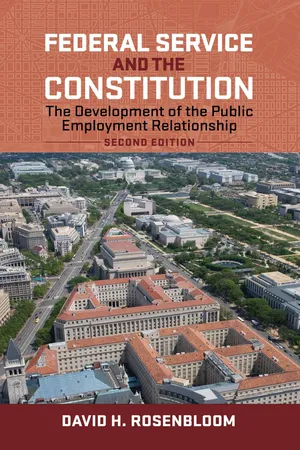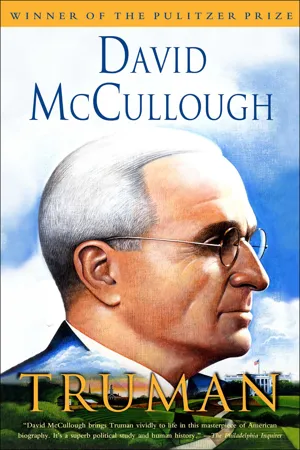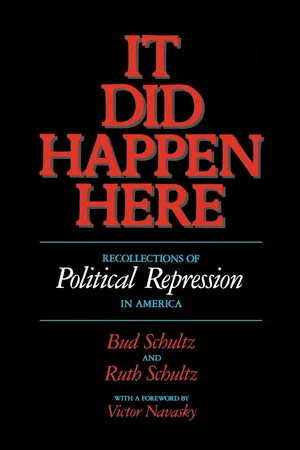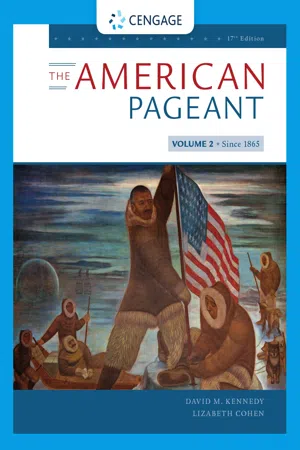History
Loyalty Review Board
The Loyalty Review Board was a government agency established in the United States in 1947 to investigate federal employees for alleged disloyalty to the government. It was part of the broader anti-communist efforts during the Cold War era. The board's actions were controversial and raised concerns about civil liberties and the potential for unjust persecution of individuals based on their political beliefs.
Written by Perlego with AI-assistance
Related key terms
1 of 5
5 Key excerpts on "Loyalty Review Board"
- eBook - PDF
Cold War and McCarthy Era
People and Perspectives
- Caroline S. Emmons(Author)
- 2010(Publication Date)
- ABC-CLIO(Publisher)
As part of the executive order, the government estab- lished a Loyalty Review Board under the direction of the Civil Service Com- mission. Although Truman privately expressed doubts that there was any substantive danger of subversion within the federal government, he agreed to support the establishment of a loyalty board in response to growing polit- ical pressure from conservative groups. It applied not only to the Department of State but to nearly every agency in the executive branch of the government; its purpose was three- fold: (1) to ensure the absolute loyalty of all federal employees, (2) to ensure that no disloyal persons would infiltrate the ranks of loyal federal employees, and (3) to protect loyal federal employees against unjust accu- sations of disloyalty. Each employee was granted the right to a hearing if “charged with being disloyal,” as well as to written notice informing him or her “of the nature of the charges against him in sufficient detail, so that he will be enabled to prepare his defense.” Charges needed to be “as complete as, in the discretion of the employing department or agency, security con- siderations permit” and that, in submitting information to government agencies, investigative agencies such as the FBI could, at their discretion, “refuse to disclose the name of confidential informants,” so long as they pro- vided “sufficient information” so that the employing agencies could make “an adequate evaluation of the information furnished them.” In practice, most charges were based on FBI information, and the FBI would not divulge its sources and methods or make its agents or informants available for testi- mony. As a result, federal employees investigated under the loyalty program were usually provided only extremely vague charges, not told the sources of allegations against them, and denied the right to cross-examine their (unknown) accusers. - eBook - ePub
Federal Service and the Constitution
The Development of the Public Employment Relationship, Second Edition
- David H. Rosenbloom(Author)
- 2014(Publication Date)
- Georgetown University Press(Publisher)
United States v. Lovett, a decision that influenced the decline of the doctrine of privilege by holding that barring individuals from public employment could violate the Constitution.In March 1947, under considerable pressure from the Republican-dominated Congress, President Truman issued Executive Order 9835, known as the “Loyalty Order,” which extensively modified the system of regulations concerning loyalty-security developed during World War II.33 The order was based on the assumption that “maximum protection must be afforded the United States against infiltration of disloyal persons into the ranks of its employees, and equal protection from unfounded accusations of disloyalty must be afforded the loyal employees of the Government.” The order required “a loyalty investigation of every person entering the civilian employment of any department or agency in the executive branch of the Federal government,” and provided that “the head of each department and agency…shall be personally responsible for an effective program to assure that disloyal civilian officers or employees are not retained in employment in his department or agency.”34 The order further provided for the establishment of the Loyalty Review Board (LRB) within the CSC to review cases and generally oversee loyalty-security matters as well as for the appointment of agency and departmental loyalty boards.A federal servant charged with being disloyal had the right to a hearing before an agency or departmental loyalty board. He or she also had the right to appeal an adverse decision to the department or agency head and then to the LRB.35 At these hearings, which were not open, the federal servant was granted the right to have counsel and to present supporting witnesses and evidence. The charges were to be “stated as specifically and completely as, in the discretion of the employing department or agency, security considerations permit.”36 Although the Loyalty Order did not prohibit confrontation and cross-examination of adverse witnesses, neither did it guarantee these procedures. At the program’s inception, LRB chairman Seth Richardson stated that “disclosure of evidential sources to the employee, and the resulting opportunity of cross-examination of such sources by him will probably not be practicable.”37 - eBook - ePub
- David McCullough(Author)
- 2003(Publication Date)
- Simon & Schuster(Publisher)
On Friday, March 21, 1947, nine days after his address to Congress, Truman issued Executive Order No. 9835, establishing an elaborate Federal Employees Loyalty and Security Program. And he did so with misgivings.Roosevelt, in 1942, had empowered the Civil Service to disqualify anyone from government employment where there was a “reasonable doubt of loyalty,” and by executive order Roosevelt later assigned the Justice Department and FBI to check on the loyalty of government workers. But that had been during the war. Until now, no such step had ever been taken in peacetime.His purpose, Truman later wrote, was twofold: to guard against disloyal employees in the government work force, and to protect innocent government workers from unfounded accusations. To show that he had no intention of playing politics with the program, he put a conservative Republican, a prominent Washington lawyer named Seth Richardson, in charge of its Review Board.All federal employees were to be subject to loyalty investigations, whatever their jobs. FBI files and the files of the House Un-American Activities Committee would be called into use. Anyone found to be disloyal could no longer hold a government job. Dismissal could be based merely on “reasonable grounds for belief that the person is disloyal,” yet the term “disloyal” was never defined. Moreover, those accused would be unable to confront those making charges against them, or even to know who they were or what exactly the charges were. In addition, the Attorney General was authorized to draw up a list of subversive organizations.To David Lilienthal, who well knew the torment that self-proclaimed Communist-hunters could bring down on a loyal government employee, the whole program looked ominous. Anyone serving in the government could be at the mercy of almost any malevolent accuser. “In practical effect,” Lilienthal wrote in his diary, “the usual rule that men are presumed innocent until proved guilty is in reverse.” Yet Lilienthal, too, conceded that something of the sort probably had to be initiated, and so staunch an upholder of liberal principle as the New York Post - eBook - PDF
It Did Happen Here
Recollections of Political Repression in America
- Bud Schultz, Ruth Schultz(Authors)
- 1990(Publication Date)
- University of California Press(Publisher)
His poems, plays, and associations were weighed against him by loyalty boards, the beginning of an ordeal that disrupted the life of this gentle and sensitive man for decades. A product of the Cold War, Harry Truman's loyalty program of March 1947 marked the onset of McCarthy ism. All government work-ers had to pass a test of their beliefs and associations. Grounds for dis-missal were membership in, affiliation with or sympathetic association with any foreign or domestic organization, association, movement, group or combination of persons designated by the Attorney General as totalitarian, Fascist, Communist or subversive ' — a grand statement of guilt by association. Loyalty boards screened millions of employees to determine whether at some future date they might commit a disloyal act, based on books they read, friends they had, or groups they belonged to. The inquisitors' sense of what constituted disloyalty can be gauged from some of the questions asked: Have you ever had Negroes in your home? Are you in favor of the Marshall Plan? There is suspicion in the record that you are in sympathy with the underprivileged. Is this true? 1 165 ARTHUR DRAYTON Arthur Drayton 167 Few of the safeguards so fundamental to a fair trial were afforded the employees. Once accused, it was up to them to prove their inno-cence. There was no impartial judge. The board that made the charge conducted the inquiry and rendered the verdict. 'There was no chance to confront and cross-examine the accusers. There was no protection from double jeopardy. Someone cleared once could be fired a second time for the same charges. No one fired by loyalty boards was charged with committing an illegal act, but thousands of people had their lives ruined. Jobs were lost, marriages were broken, and many suffered extreme men-tal and emotional distress. And what of those not yet suspect? They learned to be careful. - eBook - PDF
- David Kennedy, Lizabeth Cohen(Authors)
- 2019(Publication Date)
- Cengage Learning EMEA(Publisher)
• 34-11 The Cold War Home Front As never before, international events deeply shaped American political and economic developments at home in the years after World War II. The solidifying Cold War with Russia fueled domestic political con-flict and drew new boundaries for acceptable political opinion. Meanwhile, the postwar economic order that the United States helped to forge, combined with Cold War spending and investment, laid the foundations for a Long Boom that transformed the country over the next several decades. A new anti-red chase accelerated within America’s borders as U.S.-Soviet relations froze. Many nervous citizens feared that communist spies, paid with Moscow gold, were undermining the government and treacherously misdirecting foreign policy. In 1947 Truman launched a massive “loyalty” program. The attorney general drew up a list of ninety supposedly disloyal organizations, none of which was given the opportunity to prove its innocence. The Loyalty Review Board investigated more than 3 million federal employees, some 3000 of whom either resigned or were dismissed, none under formal indictment. Individual states likewise became intensely security- conscious. Loyalty oaths in increasing numbers were demanded of employees, especially teachers. The gnawing question for many earnest Americans was, Could the nation continue to enjoy traditional free-doms—especially freedom of speech, freedom of thought, and the right of political dissent—in a Cold War climate? In 1949 eleven communists were brought before a New York jury for violating the Smith Act of 1940, the first peacetime antisedition law since 1798. Convicted of advocating the overthrow of the American govern-ment by force, the defendants were sent to prison. The Supreme Court upheld their convictions in Dennis v. United States (1951). The House of Representatives in 1938 had established the House Un-American Activities Committee (HUAC) to investigate “subversion.” In 1948 committee member Richard M.
Index pages curate the most relevant extracts from our library of academic textbooks. They’ve been created using an in-house natural language model (NLM), each adding context and meaning to key research topics.
